Integrated Training to Tackle Maritime Crimes Through Strengthened Judicial and Law Enforcement Capacity by UNODC’s Global Maritime Crime Programme (GMCP)
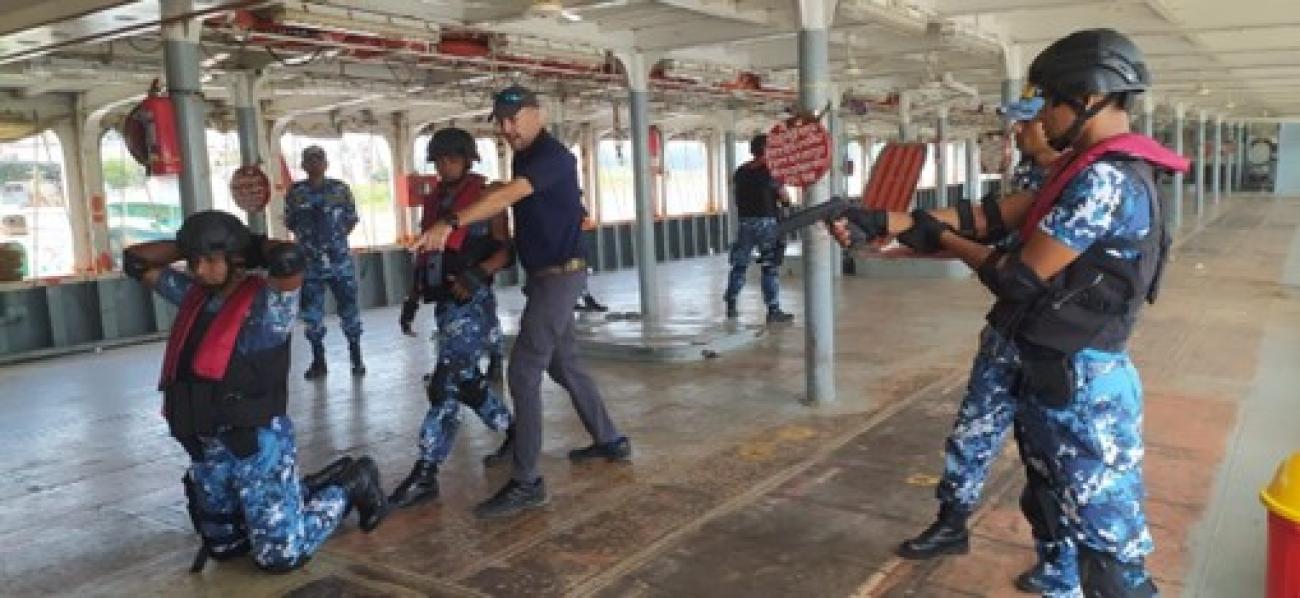
Cox’s Bazar, Bangladesh, 28 November 2023
Coastal states within the Indian Ocean, notably Bangladesh, confront various maritime security threats, including illicit drug trafficking and human trafficking. These challenges significantly impact Bangladesh's national interests, particularly in terms of safety and security. The nation's heavy reliance on seaborne trade underscores the critical need to address these maritime security threats. Doing so is essential not only for safeguarding the well-being of its citizens but also for ensuring the uninterrupted flow of goods and commerce, vital for sustained economic growth. Consequently, enhancing maritime security is imperative for Bangladesh to comprehensively protect its national interests, encompassing both the safety of its people and the resilience of its economic activities.
Over the past few decades, the country has grappled with substantial maritime challenges, ranging from illegal fishing to drug trafficking, human trafficking, and migrant smuggling. The situation is further exacerbated by the influx of Rohingya refugees in the coastal town of Cox’s Bazar, posing a growing concern for both the national security of Bangladesh and the broader maritime security in the region. Addressing these multifaceted challenges is crucial for fostering stability and safeguarding the well-being of the nation.
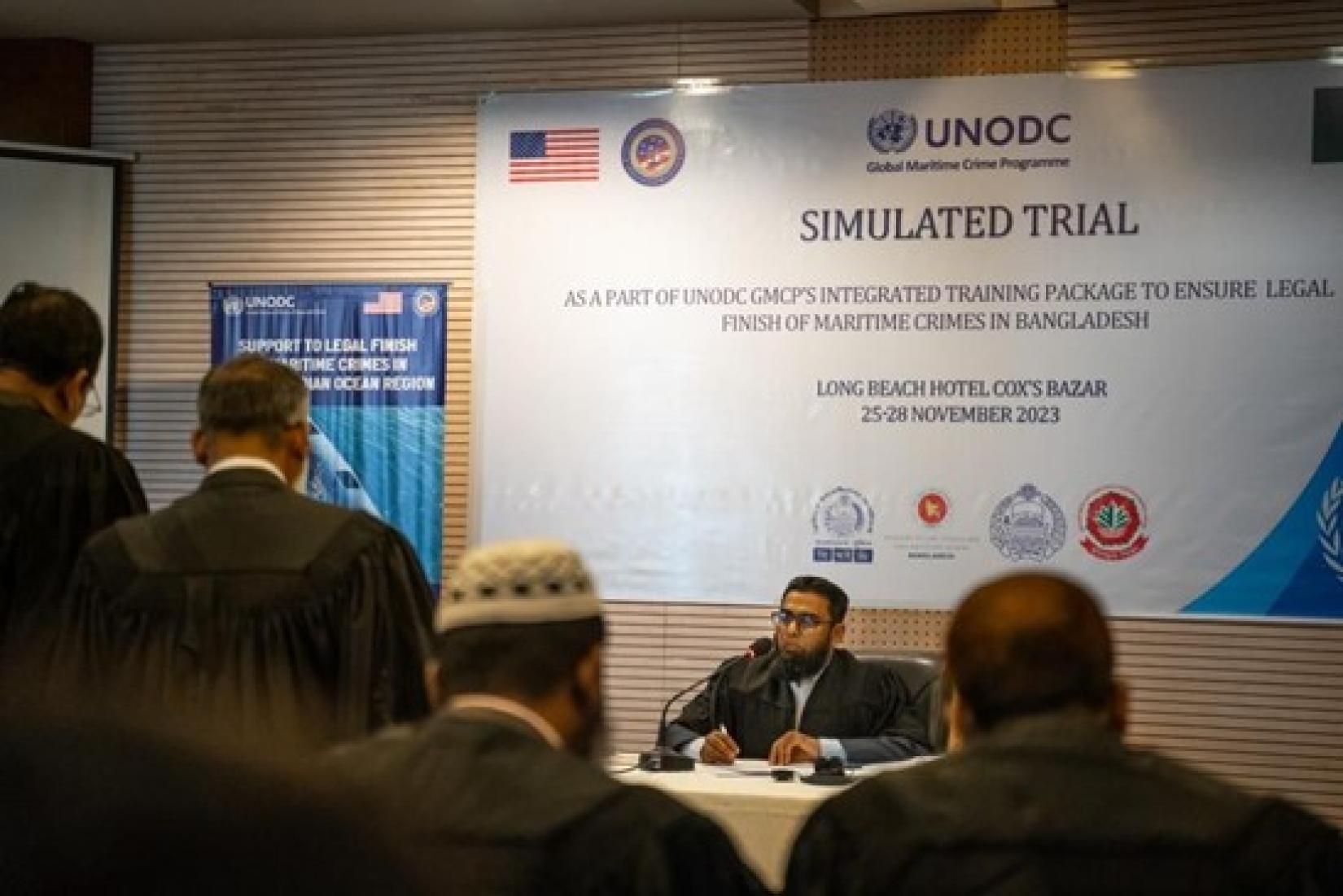
Judge listening to prosecutors while cross-examining a witness during simulated trial in Cox’s Bazar.
Against this backdrop, the United Nations Office on Drugs and Crime (UNODC)’s Global Maritime Crime Programme (GMCP) introduced an Integrated Training Package (ITP) to ensure the legal finish of maritime crimes. This initiative intends to enhance the prosecutorial and law enforcement capabilities of the national government agencies, as well as preserving the chain of custody to ensure that maritime crimes are properly detected, investigated and prosecuted. It encompasses a multi-phased, hands-on, consecutive capacity-building approach, including:
- A Visit, Board, Search, and Seizure (VBSS) course, through which coast guard and/or navy personnel are trained on the safe conducting of maritime interdiction operations;
- A mock crime scene on board a vessel, bringing together coast guard/navy personnel with investigating and forensic teams for evidence collection and management;
- An Evidence Handling training course, aimed at enhancing the skills of law enforcement and/or forensic personnel on the proper procedures for collecting, preserving, documenting, and managing evidence;
- Mentoring to investigating officers and relevant law enforcement personnel in the development of evidence packages in preparation for the case;
- A Prosecutors training course, aimed at strengthening the capabilities of prosecutors in the principles of the United Nations Convention on the Law of the Sea (UNCLOS), witness management, examination and cross-examination, and overall advocacy skills;
- A simulated trial, where trainees from all previous stages participate in a mock court trial to test the above, in line with national practices and legislation in the prosecution of maritime crimes.
UNODC GMCP implemented the first ITP on 03 September- 10 October 2023, which focused on a drug trafficking case scenario. Inspired by true events, the case scenario was related to an incident that involved the interception of a vessel in the Buriganga River suspected of carrying yaba pills. UNODC brought together members of the entire criminal justice system, from law enforcement to prosecutors and defense lawyers, as well as a judge experienced in drug cases. Through this exercise, participants were enlightened with different skills of presenting arguments and proper use of evidentiary documents before a court of law resulting in enhancing their expertise in dealing with drug trafficking cases.
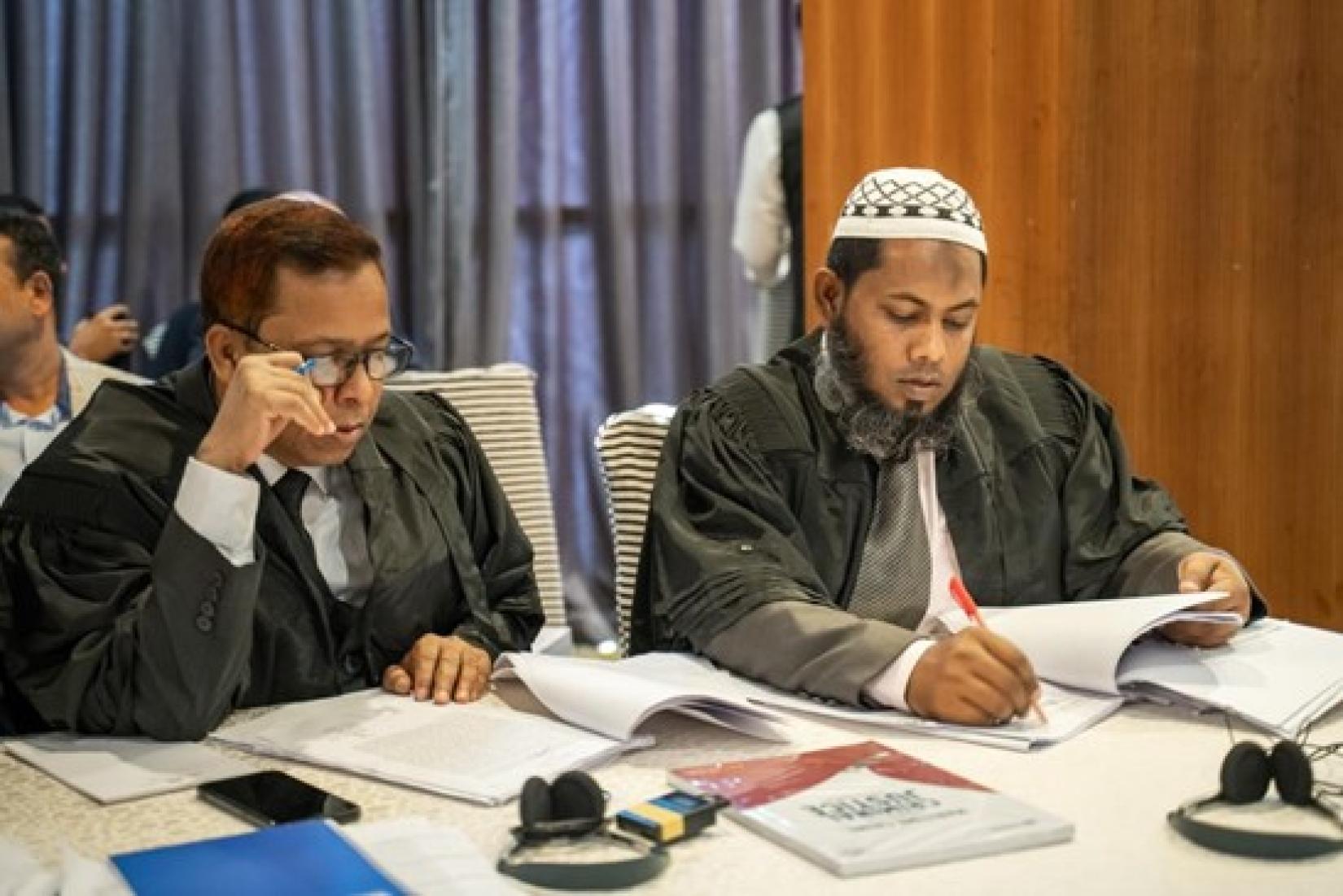
Prosecutors taking notes during first days of the simulated trial in Cox’s Bazar.
Following the success of this ITP, UNODC GMCP designed and implemented a second ITP on 22 October - 28 November 2023. In this occasion, the case scenario combined elements of a drug trafficking and trafficking in persons incident off the Naf River, in the border with Myanmar. As part of this ITP, UNODC brought together participants from the Bangladesh Coast Guard; Department of Narcotics Control; Bangladesh Police (including the Criminal Investigation Department (CID) and local police); prosecutors from the Solicitors Wing of the Ministry of Law, Justice and Parliamentary Affairs, and a judge from the same Ministry, as follows:
- 12 Coast Guard officials trained on a VBSS course, including techniques to safely board overcrowding vessels. Given the focus on trafficking in persons, UNODC GMCP partnered with UNODC’s Global Action against Trafficking in Persons and the Smuggling of Migrants (GLO.ACT) in Bangladesh for the delivery of special sessions on defining trafficking in persons and smuggling of migrants, analyzing key aspects of domestic legal frameworks, and understanding the role of Coast Guard as first responders in identification and rescue of trafficking victims, as well as exploring the international context through the United Nations Convention on Transnational Organized Crime (UNTOC);
- 16 officials from Bangladesh Police and Department of Narcotics Control trained on Evidence Handling techniques; delivered in partnership with the Naval Criminal Investigative Service (NCIS);
- 8 officials from Bangladesh Police and Department of Narcotics Control mentored during the evidence package preparation, including victims’ statements, memorandum of evidence, order of filing a charge sheet and more;
- 9 prosecutors trained in advocacy skills, and law of the sea. For the purposes of the simulated trial, the trained prosecutors were divided into two teams, with one representing the prosecution for the Government of Bangladesh, and the other representing the defence, and;
- 20 participants to the simulated trial, including the judge.
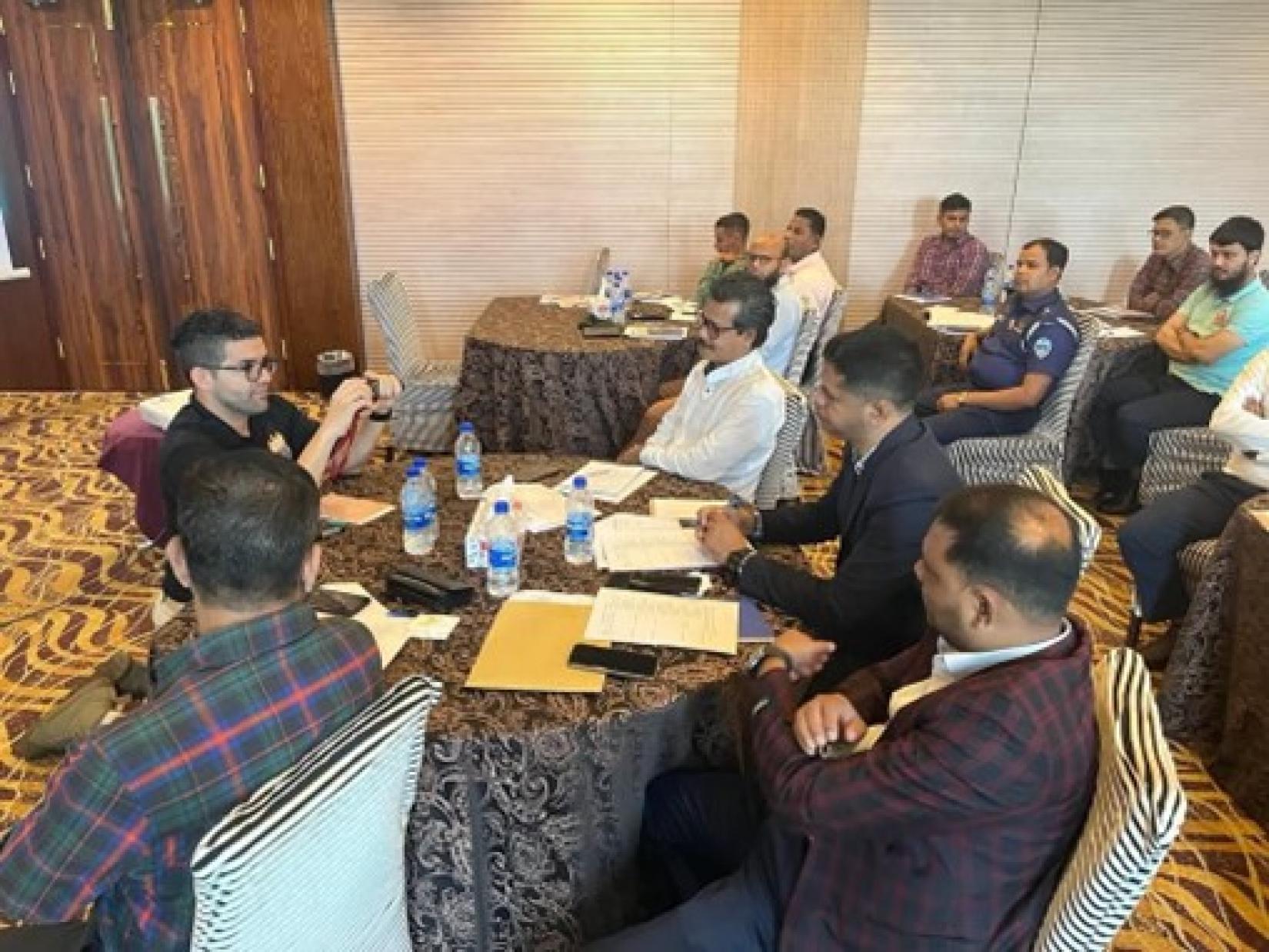
Participants attending Evidence Handling course delivered a Law Enforcement Advisor Afloat from the US Naval Criminal Investigative Service (NCIS) in Cox’s Bazar.
The case for this ITP involved a vessel intercepted by the Bangladesh Coast Guard in the Naf River suspected of engaging in illicit activities, discovering drugs and people being abused on board. The elements of these case enabled participants to understand the challenges and opportunities for the prosecution of a trafficking in persons case with links to the smuggling of drugs by coercion. At the verdict, the judge ruled in favor of the prosecution, finding the accused guilty under provisions of the Prevention and Suppression of Human Trafficking Act, 2012.
The ITP developed by UNODC GMCP represents a comprehensive initiative that seamlessly integrates a maritime interdiction course, crime scene simulation, and prosecutorial aspects within a unified framework. By bringing together diverse skill sets, the ITP equips participants with the necessary tools to enhance their proficiency in addressing and resolving maritime crimes. The inclusion of a maritime interdiction course ensures that MLE officers are adept at efficiently intercepting and deterring criminal activities at sea. Simultaneously, the crime scene simulation component immerses participants in realistic scenarios, allowing them to hone their investigative skills and develop a keen understanding of the complexities involved in maritime crime investigations. Lastly, the prosecutorial aspects integrated into the program empower legal professionals to navigate the intricacies of building a strong case against maritime criminals, ultimately contributing to the successful prosecution of offenders.
Considering the prevailing maritime challenges in Bangladesh, UNODC remains committed to supporting the Government of Bangladesh in its efforts to combat maritime crimes. By continually refining and expanding initiatives like the ITP, UNODC strives to enhance the capacity and capability of Bangladesh's law enforcement and criminal justice entities. This collaborative endeavor not only fortifies the national response to maritime crimes, but also contributes to regional and international efforts to maintain maritime security in South Asia, and the Indian Ocean region.
These activities are funded by the Bureau of International Narcotics and Law Enforcement Affairs (INL) of the United States of America and the Government of Japan and contributes to SDG-16.
For more information about UNODC GMCP, please visit https://www.unodc.org/unodc/en/piracy/index.html.
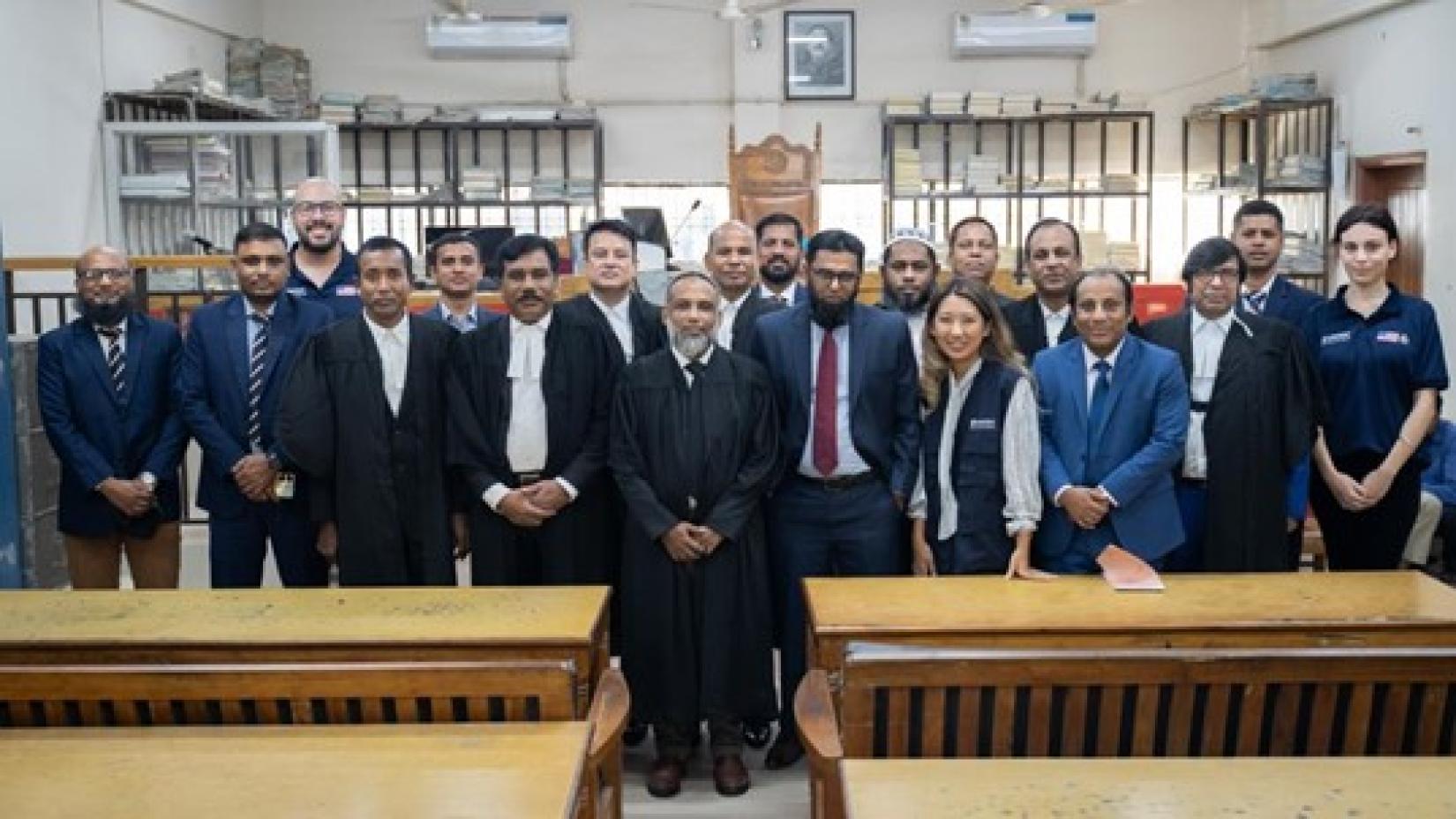
Prosecutors, judge and UNODC team at a courthouse in Cox’s Bazar.







